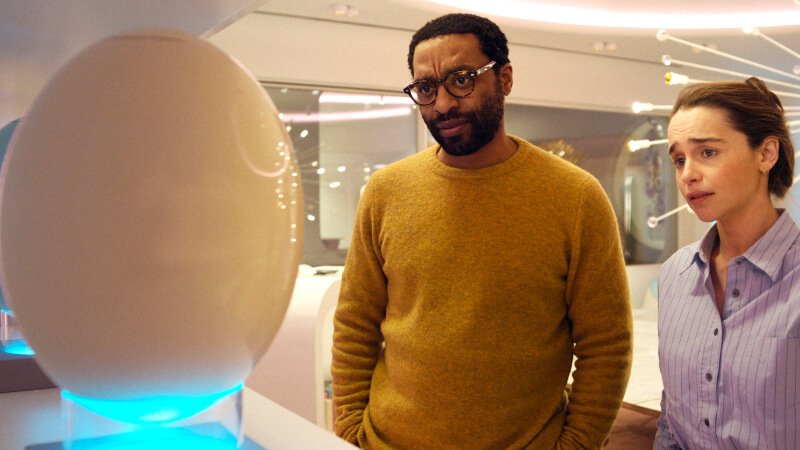It’s 7 a.m. and the house is waking up. Rachel Novy (Emilia Clarke), fresh from a nightmare about having a baby, arises for her morning routine as the kitchen is making her breakfast. Alana, her personal AI assistant, reminds Rachel about her appointments. Congratulates her on improving her gut biome. Rachel gives husband Alvy (Chiwetel Ejiofor) some coffee in bed before heading off to work.
After the conclusion of a particularly successful project, Rachel’s boss informs her that they love her work and want to promote her. In order to assure childbirth won’t disrupt a promising career, they have arranged to bump her up on the waitlist at the Womb Center.
The what?
In this not-quite distant future, couples can have their baby gestate in a pod (which looks like a plastic egg) instead of opting for natural childbirth. So many advantages. No disruption to family routines. No stress, physically or emotionally, for the mother. It also enables ambitious professional women to avoid having childbirth derail their career trajectory.
One problem: Rachel never told husband Alvy she signed up for the waiting list. You see, Alvy is a botanist. In his classes, he introduces his students to the pleasure of tasting fresh fruit and appreciating the social tendencies of trees. (Yes, at one point he actually has his students hug a tree.)
When Rachel breaks the news, Alvy is stunned. But in the coming days the inevitable argument between them about pod versus natural childbirth doesn’t become ugly. Alvy wants a child, and he wants Rachel to be happy. He relents.
As the “pregnancy” progresses, mom and dad’s attitudes individually go through surprising transformations. Best leave it at that so you can experience it yourself. Or not.
Skip It
What exactly is The Pod Generation? Certainly it has ambitions to lean more into satire than dark comedy. No one is cracking jokes. But everywhere the absurdity of technology taking over our lives is present. Example: Alvy is persuaded to consult Rachel’s AI therapist. The AI’s counseling is straight out of stereotypical Twentieth Century parody: tell me more; how does that make you feel. The session ends with a sales pitch. Another: Alvy’s classes are meant to give students a tactile experience with nature. His boss suggests that, since money is tight, they might replace the plants with holograms.
My key hesitation about recommending The Pod Generation: There’s a difference between raising an issue and discussing its ramifications. The Pod Generation depicts a series of ludicrous encounters with AI assistants and with the human managers of this tech, happy-faced posers whose allegiances are to corporate profits rather than human needs. But you can’t excuse the lack of depth as just an attempt to craft a dark comedy and let viewers decide. Sure, the encounters are laughable, but that’s not the same as being funny. Nowhere are any of the ideas allowed a substantial examination.
The opposing sides of this non-debate are reflected in the stars’ performances. Emilia Clark is initially the proponent of all that technology can do to make one’s life easier and more comfortable. Her smiles are painfully inauthentic, her expressions of concern exaggerated. Down deep, she knows it’s all a sham and has to work hard to hide it. Still, one comes away wishing the director had said, “Let’s try another take; this time dial it down a bit.”
On the opposite side, Chiwetel Ejiofor’s restrained performance is an apt fit for the naturalist who’s constantly astonished at the ridiculousness of the way technology is subsuming nature. He never overplays it, striking a fine balance between exasperation and resentful acceptance. And yet, one wishes he might have been just a bit more argumentative and acerbic.
Kudos go to Rosalie Craig as the Womb Center director who is so very convincing in her insincerity and faux concern for customers, spinning an ever tighter contractual web around Rachel and Alvy as their delivery date approaches.
If you decide to watch it anyway, be aware you’ll feel cheated by the ending. I certainly didn’t want a Rosemary’s Baby-like shocker, but I was left wanting something with a touch more bite. But I have to admit the final frame, with its distinct lack of resolution, was perhaps the only way the filmmakers could escape from a story from which they raised many questions and never had, nor apparently intended, any answers.
By the way, if you watch deep into the credits, there’s a final scene whose embarrassing ridiculousness somewhat undercuts the more serious earlier questions.
